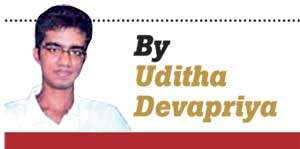07 Dec 2018 - {{hitsCtrl.values.hits}}

“Sri Lanka is witnessing a constitutional experiment that is fast turning out to be elitist and exclusionary. A popular mandate seems to be dwarfed by an unelected Regency.” (Sarath de Alwis, in 2015)
Somewhere in 2016, Thisuri Wanniarachchi wrote an article criticising, among other things, the culture of Big Matches and school fraternities in Sri Lanka. She seemed to believe that these were symptomatic of; a) social and intellectual backwardness, since for her they seemed to indicate that past pupils believed school was the farthest they can get in life; b) misogyny, with regard to the segregation between boys’ and girls’ schools; and c) homophobia, since students from boys’ schools revel in flaunting themselves as “drag queens” at cycle parades. If ever an award is presented for articles that attracted the most hype in a given year, Thisuri’s article will get top honours for 2016. People wrote about it, people wrote against it, some supported her stance, and many others (including myself) wrote it off as set of rants and raves and sweeping, crass generalisations. Still, in hindsight, I believe it was valid.
A close friend of mine, who calls himself a “child of 1956,” once lamented that most of our schools, especially those demarcated as “privileged” and “popular,” tend to de-radicalise those who enter them. For the record, this person was a past student of one of these popular schools, though he had cut off virtually all contact with it after he left. He argued (cogently, I should think), that an education system over which we spend more time spawning its own sense of self-worth, in the form of those notions of what is “popular” and “elite” and what is not, can only lead to the intensification of the rifts and deficits that have assailed our society for so long. 
My friend got the point Thisuri didn’t (or almost got): at present, our education system, particularly when it comes to our schools, are (as she put it correctly) socially malnourished. But this is not ONLY because they reflect misogyny and homophobia and what not, even though these are problems that are relevant and pressing. Rather, it is because they don’t teach us enough to look beyond the four walls within which we are sheltered; in short, that they don’t teach us to open up our minds.
No, this is not about whether our schools (can) breed original thinkers. There’s no denying that they do. But thinkers who go as far as to question the very institutions of power that nurture them: these are, I feel, sorely lacking today.
I’m not suggesting that we do not have radicals; rather, the radicalism they spout tends to be undone by ideological obfuscations. Just look at the “radicals” who made the headlines with their links with a State-owned corporation that is alleged to have doled money to them in return for their “radicalism” (I am talking about those Yahalapanist propagandists, by the way). Just look at the protestors who were there, ostensibly out of a love for democracy, but in fact out of a love for the person who had been ousted by the President. Given this, where are the REAL radicals?
We live in a country where out of 10,162 national schools, only 867 have adequate facilities for science education. We live in a country where regions recording the highest income disparities, especially Moneragala, produce the highest number of arts graduates, many of whom, because of those prejudiced views of artistes we  cherish dearly, end up on the road as picketers, protesters, and peddlers. Given that the system has been geared for the few, then, what should the role of the few be? In other words, how should we address the deficit between the 867 and the 10,162? It is a question that no amount of reforms and commissions has resolved.
cherish dearly, end up on the road as picketers, protesters, and peddlers. Given that the system has been geared for the few, then, what should the role of the few be? In other words, how should we address the deficit between the 867 and the 10,162? It is a question that no amount of reforms and commissions has resolved.
What makes it even worse is the fact that, for the most, the system runs on a fiction of equality in terms of teaching and exam material. A student in Kekirawa may get the same paper a student in Kurunduwatte does (dumbed down, so the defenders of the system tell us, to accommodate the Kekirawa student), but it will not compensate for the fact that the Kekirawa school does not have labs and adequate provisions to hold practical exams for potential science stream students.
The counter-argument to this is that the standardisation of results (the Z-score) ensures that a student from Kekirawa has as much a chance as a student from Kurunduwatte to enter university. Again, however, even if the Kurunduwatte student gets 3As and still can’t enter, and a student from a less privileged background gets 2As and 1 B and does, this will not conceal the deeper structural rifts, in terms of qualified teachers, classroom facilities, and so on, between Kekirawa and Kurunduwatte.
"Max Weber observed that in every structure of domination, there is a mechanism through which power relations are transformed to sanctified rights "
The most typical response I get from the entrenched (read, “privileged”) young is that there is no point in gearing the system to the advantage of the unprivileged, since the unprivileged are driven by a campaign of resentment and envy against them: “There’s no point talking about it, because at the end of the day they will always want to deny us the things we were born to, through no fault of our own.”
Was this not the same perception that coloured the prejudices of those from Ranil Wickremesinghe’s Reid Avenue clique against the multitude, the same multitude over whom were imposed, in the aftermath of the UNP victory in 2015, a set of beliefs that (as Dayan Jayatilleka wrote) affronted their national identity? What else could explain the cabalistic, ineffable elitism of the crowd that rallied around Ranil and the UNP for no reason other than the fact that they belonged to a certain class: a class of first-class thieves and robbers, who perpetuated the myth that gentlemen don’t rob (as my friend the poet of Thimbirigasyaya put it, we are wont to call thugs with names like “Soththi Upali” and “Baddegana Sanjeewa,” but we are shy to refer to the former Central Bank Governor, even in jest or half-jest, as “Pamankada Arjuna”).
The privileged, in other words, have been de-radicalised from an early age, and it is this problem, rather than the problem of misogyny and homophobia Thisuri wrote on, that has prevented elite schools from nurturing progressivism in their vicinity. This problem, however, is more complex than a simple/simplistic battle between the elite and the subaltern, and while I will say that such a battle exists and is being waged within our schools even now (“the many against the few”), it does not deserve the kind of generalisations commentators tend to paste over their tracts against it.
The fact is that these institutions of privilege are no longer the preserve of the wealthy; rather, they are now the preserve of a multitude of milieus from the elite AND the subaltern, both affiliated to that cabalistic, ineffable culture of elitism. Ranil and his regency were hence not celebrated from this subset by the English-speaking crowd only: they were celebrated by the monolingual subaltern as well, many of whom probably couldn’t put five English words together.
In other words, they were revelling in a kind of anti-radical elitism that superficially was based on membership of a clan not rooted in money or power, but was in actual fact rooted in a compradore, petty merchant class. The subaltern section of this young bourgeoisie (which included the rural petite bourgeoisie, i.e. those who hail from the scholarship milieu), in other words, were (mindlessly) celebrating the victory of a group of privileged, bewildered, and outmoded dinosaurs.
"Out of 10,162 national schools, only 867 have adequate facilities for science education"
This “underclass,” thus relishing in their membership of that elitist hub, laid aside the reality of the social stratifications which had relegated them, from birth, to the lower orders. I find this to be less of a farce than a tragedy, and I’m sure Marx would agree. Some people are fond of comparing sections of the ethnic minorities calling for the return of Mahinda Rajapaksa to Jews calling for the triumph of the Third Reich. By that logic, the “Reid Avenue subalterns” allied with Ranil Wickremesinghe and his Colombo 7 clique can be compared to serfs celebrating the return of the Tsar.
Max Weber, whom I never fail to go back to, observed that in every structure of domination, there is a mechanism through which power relations (which are material) are transformed to sanctified rights (which are symbolic). In feudal societies, Loïc Wacquant once observed, it was the church that facilitated this transformation; in modern societies, he surmised, it was the school.
Wacquant made this point in his foreword to the seminal work of the role that schools play in perpetuating rifts in society, The State Nobility. It was written by another eminent sociologist, in my opinion one of the greatest from the second half of the preceding century, Pierre Bourdieu. Now I am not a social theorist by any stretch of the imagination, but I feel that what Bourdieu wrote can be applied to our schools as well; a fiction of equality, celebrated by educationists, thrives on a set of structural anomalies, all of which rest on the advantages gained by the 867 over the 10,162. We need to address that. And fast. For that though, we need radicals. Are they ready?
30 Nov 2024 2 hours ago
30 Nov 2024 5 hours ago
30 Nov 2024 6 hours ago
30 Nov 2024 9 hours ago
30 Nov 2024 30 Nov 2024